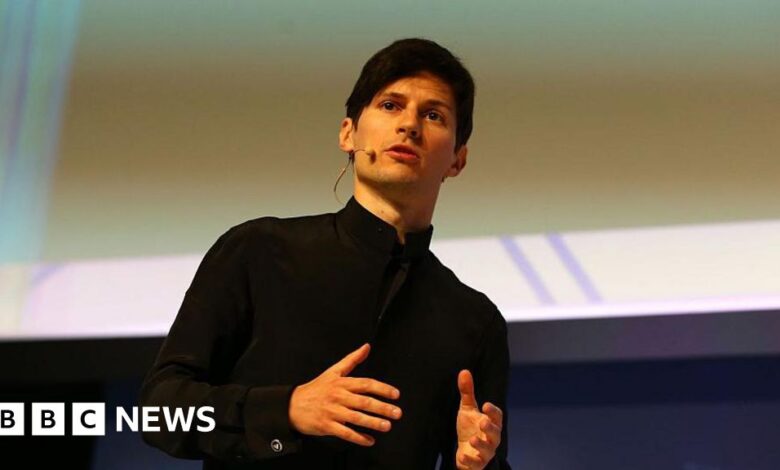In Russia, many questions surround the arrest of Telegram CEO

Since Pavel Durov, Russian billionaire and founder of messaging app Telegram, arrested upon landing in Paris on Saturday nightThere is more speculation than solid information about his fate.
A headline in a Russian newspaper summed up the story: “The arrest (or detention) of ‘Russia’s Zuckerberg,’ Pavel Durov, is one of the most important but mysterious global news events,” declared Nezavisimaya Gazeta.
THAT’S RIGHT.
Except “mysterious” seems a bit too much.
Why were you arrested by French police? What charges will you face? Is it related to your recent visit to Azerbaijan, where you met (or didn’t meet) Russian President Vladimir Putin?
For two days, reporters have been citing “sources close to the investigation” about possible charges against Pavel Durov (ranging from complicity in drug trafficking to fraud). Telegram has issued a statement saying that Mr. Durov “has nothing to hide.”
On Monday evening, the Paris prosecutor said in a statement that Mr. Durov was being held in custody as part of an investigation into cybercrime.
The statement mentioned 12 different crimes being investigated and said they were linked to organized crime.
Prosecutors said those acts included illegal transactions, child pornography, fraud and refusing to disclose information to authorities.
The statement added that Mr Durov’s detention had been extended and could last until Wednesday.
Without going into details, President Emmanuel Macron posted on social media that he had seen “false information” about France following Mr Durov’s arrest, adding: “This is not a political decision. It is up to the judges.”
In Moscow, the Kremlin is being cautious.
“We still do not know exactly what Durov is accused of,” Kremlin spokesman Dmitry Peskov told journalists on Monday, in his first comments on Pavel Durov’s arrest.
“We have not heard any official statement. Before I can say anything on this matter, we need some clarity.”
Clarity is not something everyone in Russia feels the need for.
On Monday, state television’s flagship political talk show had plenty to say on the issue.
“All the accusations against Durov sound absurd,” said a political analyst in the studio. “Accusing him of all the crimes committed on his platform is like accusing [France’s] President Macron among all the crimes that happen in France. It’s the same logic.”
Russian newspapers also reported extensively on the incident. Some expressed concerns that Pavel Durov’s arrest could have serious consequences for Russia.
“This blow to Telegram threatens to be a blow to Russia,” Nezavisimaya Gazeta wrote. “With the arrest of Pavel Durov, Western intelligence agencies may be able to obtain the messenger’s encryption key.”
“Telegram could become a NATO tool if Pavel Durov is forced to comply with the French intelligence services,” Moskovsky Komsomolets said, adding: “Telegram chats contain a huge amount of extremely important strategic information.”
In April 2018, Russian authorities began blocking access to Telegram, only lifting the ban in 2020. Today, not only Russian officials use this messaging app, but also the Russian military, including soldiers fighting in the so-called “Special Military Operation” (Russia’s war in Ukraine).
“If Telegram collapses,” Moskovsky Komsomolets asked today, “what then? [our army] going to fight?
In the West, the arrest of Pavel Durov has sparked debate about freedom of speech.
In Russia, presidential human rights ombudsman Tatyana Moskalkova also stated that “the real reason for arresting Pavel Durov was to shut down Telegram, a platform where you can find out the truth about what is happening in the world. Everyone who fights for freedom of speech is against this.”
Ms Moskalkova did not mention the messaging app Signal, which Russian authorities blocked access to earlier this month, or YouTube, which is already heavily restricted in Russia. Facebook and Instagram are already blocked there.
And what about the rumors about a meeting between Putin and Durov in Baku in early August? Are there any?
“No,” Kremlin spokesman Dmitry Peskov replied when I asked.
However this mysterious story ends, Moscow will use it to reinforce one of its official narratives: that Russian citizens should be wary of the West.
As the popular tabloid Komsomolskaya Pravda wrote: “For the West, there is no such thing as a ‘good Russian’ anymore.”




